Renan Ernest
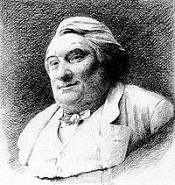
Ernest Renan (28 February 1823 – 12 October 1892) was a French philosopher and writer, devoted to his native province of Brittany. He is best known for his influential historical works on early Christianity and his political theories. He was born at Tréguier in Brittany to a family of fishermen. His grandfather, having made a small fortune with his fishing-shack, bought a house at Tréguier and settled there, and his father, captain of a small cutter and an ardent republican, married the daughter of Royalist tradesmen from the neighbouring town of Lannion. All his life, Renan felt conflicted between his father's and his mother's political beliefs. He was five years old when his father died, and his sister, Henriette, twelve years his senior, became the moral head of the household. Having in vain attempted to keep a school for girls at Tréguier, she departed and went to Paris as teacher in a young ladies' boarding-school. Ernest, meanwhile, was educated in the ecclesiastical seminary of his native place. His school reports describe him as "docile, patient, diligent, painstaking, thorough". While the priests taught him mathematics and Latin, his mother completed his education. Renan's mother was half Breton. Her paternal ancestors came from Bordeaux, and Renan used to say that in his own nature the Gascon and the Breton were constantly at odds. During the summer of 1838, Renan won all the prizes at the college of Tréguier. His sister told the doctor of the school in Paris where she taught, and he gave news to FAP Dupanloup, who was involved in organizing the ecclesiastical college of St Nicholas du Chardonnet, a school in which the young Catholic nobility and the most talented pupils of the Catholic seminaries were to be educated together, with the idea of creating friendships between the aristocracy and the priesthood. Dupanloup sent for Renan, who was only fifteen years old and had never been outside Brittany. "I learned with stupor that knowledge was not a privilege of the church ... I awoke to the meaning of the words talent, fame, celebrity." Religion seemed to him wholly different in Tréguier and in Paris. The superficial, brilliant, pseudo-scientific Catholicism of the capital did not satisfy Renan, who had accepted the austere faith of his Breton masters. During 1840, Renan left St Nicholas to study philosophy at the seminary of Issy-les-Moulineaux. He entered with a passion for Catholic scholasticism. The rhetoric of St Nicholas had wearied him, and his serious intelligence hoped to satisfy itself with the vast and solid material of Catholic theology. Thomas Reid and Nicolas Malebranche first attracted him among the philosophers, and, after these, he turned to Georg Hegel, Immanuel Kant and Herder. Renan began to see an essential contradiction between the metaphysics which he studied and the faith he professed, but an appetite for truths that can be verified restrained his scepticism. "Philosophy excites and only half satisfies the appetite for truth; I am eager for mathematics," he wrote to Henriette. Henriette had accepted in the family of Count Zamoyski an engagement more lucrative than her former job. She exercised the strongest influence over her brother. It was not mathematics but philology which was to settle Renan's gathering doubts. His course completed at Issy, he entered the college of St Sulpice in order to take his degree in philology prior to entering the church, and, here, he began the study of Hebrew. He realized that the second part of Isaiah differs from the first not only in style but in date, that the grammar and the history of the Pentateuch are later than the time of Moses, and that the Book of Daniel is clearly written centuries after the time in which it is set. Secretly, Renan felt himself denied the communion of saints, yet desired to live the life of a Catholic priest. The struggle between vocation and conviction was won by conviction. During October 1845, Renan left St Sulpice for Stanislas, a lay college of the Oratorians. Still feeling too much under the domination of the church, he reluctantly ended the last of his associations with religious life and entered M. Crouzet's school for boys as a teacher. Renan, educated by priests, was to accept the scientific ideal with an extraordinary expansion of all his faculties. He became ravished by the splendour of the cosmos. At the end of his life, he wrote of Amiel, "The man who has time to keep a private diary has never understood the immensity of the universe." The certitudes of physical and natural science were revealed to Renan during 1846 by the chemist Marcellin Berthelot, then a boy of eighteen, his pupil at M. Crouzet's school. To the day of Renan's death, their friendship continued. Renan was occupied as usher only during evenings. During the daytime, he continued his researches in Semitic philology. During 1847, he obtained the Volney prize, one of the principal distinctions awarded by the Academy of Inscriptions, for the manuscript of his "General History of Semitic Languages." During 1847, he took his degree as Agrégé de Philosophie - that is to say, fellow of the university - and was offered a job as master in the lycée Vendôme. Within his lifetime, Renan was best known as the author of the enormously popular Life of Jesus (Vie de Jésus).[1] This book was first translated into English during 1863 by Charles E. Wilbour and has remained in print for the past 145 years.[2] Renan's Life of Jesus was lavished with ironic praise and criticism by Albert Schweitzer in his book Quest of the Historical Jesus. The book's controversial assertions that the life of Jesus should be written like the life of any other man, and that the Bible could be subject to the same critical scrutiny as other historical documents caused much controversy, and enraged many Christians.[3][4][5][6] Renan was not only a scholar. In his book on St. Paul, as in the Apostles, he shows his concern with the larger social life, his sense of fraternity, and a revival of the democratic sentiment which had inspired L'Avenir de la science. During 1869, he presented himself as the candidate of the liberal opposition at the parliamentary election for Meaux. While his temper had become less aristocratic, his liberalism had grown more tolerant. On the eve of its dissolution, Renan was half prepared to accept the Empire, and, had he been elected to the Chamber of Deputies, he would have joined the group of l'Empire liberal, but he was not elected. A year later, war was declared with Germany; the Empire was abolished, and Napoleon III became an exile. The Franco-Prussian War was a turning-point in Renan's history. Germany had always been to him the asylum of thought and disinterested science. Now, he saw the land of his ideal destroy and ruin the land of his birth; he beheld the German no longer as a priest, but as an invader. In La Réforme intellectuelle et morale (1871), Renan tried to safeguard France's future. Yet, he was still influenced by Germany. The ideal and the discipline which he proposed to his defeated country were those of her conqueror-- a feudal society, a monarchical government, an élite which the rest of the nation exists merely to support and nourish; an ideal of honour and duty imposed by a chosen few on the recalcitrant and subject multitude. The errors of the Commune confirmed Renan in this reaction. At the same time, the irony always perceptible in his work grows more bitter. His Dialogues philosophiques, written in 1871, his Ecclesiastes (1882) and his Antichrist (1876) (the fourth volume of the Origins of Christianity, dealing with the reign of Nero) are incomparable in their literary genius, but they are examples of a disenchanted and sceptical temper. He had vainly tried to make his country obey his precepts. The progress of events showed him, on the contrary, a France which, every day, left a little stronger, and he roused himself from his disbelieving, disillusioned mood and observed with interest the struggle for justice and liberty of a democratic society. His mind was the broadest of the age. The fifth and sixth volumes of the Origins of Christianity (the Christian Church and Marcus Aurelius) show him reconciled with democracy, confident in the gradual ascent of man, aware that the greatest catastrophes do not really interrupt the sure if imperceptible progress of the world and reconciled, also, if not with the truths, at least with the moral beauties of Catholicism and with the remembrance of his pious youth. Renan's definition of a nation has been influential. This was given in his 1882 discourse Qu'est-ce qu'une nation? ("What is a Nation?"). Whereas German writers like Fichte had defined the nation by objective criteria such as a race or an ethnic group "sharing common characteristics" (language, etc.), Renan defined it by the desire of a people to live together, which he summarized by a famous phrase, "avoir fait de grandes choses ensemble, vouloir en faire encore" (having done great things together and wishing to do more). Writing in the midst of the dispute concerning the Alsace-Lorraine region, he declared that the existence of a nation was based on a "daily plebiscite." Karl Deutsch (in "Nationalism and its alternatives") suggested that a nation is "a group of people united by a mistaken view about the past and a hatred of their neighbours." This phrase is frequently, but mistakenly, attributed to Renan himself. He did indeed write that if "the essential element of a nation is that all its individuals must have many things in common," they "must also have forgotten many things. Every French citizen must have forgotten the night of St. Bartholomew and the massacres in the 13th century in the South." During old age, the philosopher contemplated his childhood. He was nearly sixty when, in 1883, he published the autobiographical Souvenirs d'enfance et de jeunesse, the work by which he is now best known in France. They showed the blasé modern reader that a world no less poetic, no less primitive than that of the Origins of Christianity exists or still existed within living memory on the northwestern coast of France. They have the Celtic magic of ancient romance and the simplicity, the naturalness, and the veracity which the 19th century prized so highly. But his Ecclesiastes, published a few months earlier, his Drames philosophiques, collected in 1888, give a more adequate image of his fastidious critical, disenchanted, yet optimistic spirit. They show the attitude towards uncultured Socialism of a philosopher liberal by conviction, by temperament an aristocrat. We learn in them how Caliban (democracy), the mindless brute, educated to his own responsibility, makes after all an adequate ruler; how Prospero (the aristocratic principle, or, if we will, the mind) accepts his dethronement for the sake of greater liberty in the intellectual world, since Caliban proves an effective policeman and leaves his superiors a free hand in the laboratory; how Ariel (the religious principle) acquires a firmer hold on life and no longer gives up the ghost at the faintest hint of change. Indeed, Ariel flourishes in the service of Prospero under the external government of the many-headed brute. Religion and knowledge are as imperishable as the world they dignify. Thus, out of the depths rises unvanquished the essential idealism of Renan.
do you like this author?
What readers are saying
What do you think? Write your own comment on this book!
write a commentWhat readers are saying
What do you think? Write your own comment on this author!
write a commentBook list

Vie de JésusHistoire des origines du christianisme; 1
Series:
Unknown
Year:
Unknown
Raiting:
3/5
Show more
add to favoritesadd In favorites
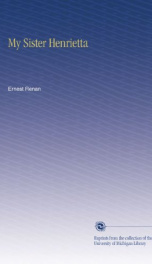
my sister henrietta
Series:
Unknown
Year:
Unknown
Raiting:
5/5
This volume is produced from digital images created through the University of Michigan University Library's preservation reformatting program. The Library seeks to preserve the intellectual content of items in a manner that facilitates and promotes a variety of uses. The digital reformatting process results in an electronic version of the text that can both be accessed online and used to create new print copies. This book and thousands of others can be found in the digital collections of the University of Michigan Library. The University Library also understands and values the utility of print, and makes reprints available through its Scholarly Publishing Office.
Show more
add to favoritesadd In favorites
Book list

Vie de JésusHistoire des origines du christianisme; 1
Series:
Unknown
Year:
Unknown
Raiting:
3/5
Show more
add to favoritesadd In favorites

my sister henrietta
Series:
Unknown
Year:
Unknown
Raiting:
5/5
This volume is produced from digital images created through the University of Michigan University Library's preservation reformatting program. The Library seeks to preserve the intellectual content of items in a manner that facilitates and promotes a variety of uses. The digital reformatting process results in an electronic version of the text that can both be accessed online and used to create new print copies. This book and thousands of others can be found in the digital collections of the University of Michigan Library. The University Library also understands and values the utility of print, and makes reprints available through its Scholarly Publishing Office.
Show more
add to favoritesadd In favorites

lectures on the influence of the institutions thought and culture of rome on c
Series:
Unknown
Year:
Unknown
Raiting:
4/5
Show more
add to favoritesadd In favorites

leaders of christian and anti christian thought
Series:
Unknown
Year:
Unknown
Raiting:
5/5
Show more
add to favoritesadd In favorites
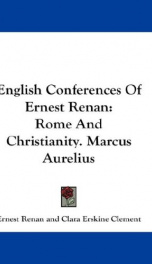
english conferences of ernest renan rome and christianity marcus aurelius
Series:
Unknown
Year:
Unknown
Raiting:
4/5
This scarce antiquarian book is included in our special Legacy Reprint Series. In the interest of creating a more extensive selection of rare historical book reprints, we have chosen to reproduce this title even though it may possibly have occasional imperfections such as missing and blurred pages, missing text, poor pictures, markings, dark backgrounds and other reproduction issues beyond our control. Because this work is culturally important, we have made it available as a part of our commitment to protecting, preserving and promoting the world's literature. --This text refers to the Paperback edition.
Show more
add to favoritesadd In favorites

brother and sister a memoir and the letters of ernest and henriette renan
Series:
Unknown
Year:
Unknown
Raiting:
4/5
Show more
add to favoritesadd In favorites
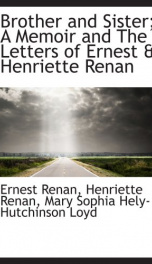
brother and sister a memoir and the letters of ernest henriette renan
Series:
Unknown
Year:
Unknown
Raiting:
4/5
Show more
add to favoritesadd In favorites

antichrist including the period from the arrival of paul in rome to the end of
Series:
Unknown
Year:
Unknown
Raiting:
5/5
Show more
add to favoritesadd In favorites

an essay on the age and antiquity of the book of nabathan agriculture to whic
Series:
Unknown
Year:
Unknown
Raiting:
5/5
Show more
add to favoritesadd In favorites
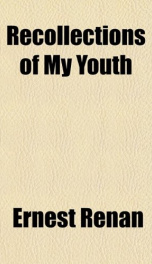
Recollections of My Youth
Series:
Unknown
Year:
Unknown
Raiting:
3.5/5
Purchase of this book includes free trial access to www.million-books.com where you can read more than a million books for free. This is an OCR edition with typos. Excerpt from book: ST. RENAN. WHEN I come to look at things very closely, I see that I have changed very little; my destiny had practically welded me, from my earliest youth, to the place which I was to hold in the world. My vocation was thoroughly matured when I came to Paris; before leaving Brittany my life had been mapped out. By the mere force of things, and despite my conscientious efforts to the contrary, I was predestined to become what I am, a member of the romantic school, protesting against romanticism, a Utopian inculcating the doctrine of half-measures, an idealist unsuccessfully attempting to pass muster for a Philistine, a tissue of contradictions, resembling the double-natured hircocerf of scholasticism. One of my two halves must have been busy demolishing the other half, like the fabled beast of Ctesias which unwittingly devoured its own paws. As was well said by that keen observer, Challemel-Lacour : " He thinks like a man, feels like a woman, and acts like a child." I have no reason to complain of such being the case, as this moral constitution has procured for me the keenest intellectual joys which man can taste. My race, my family, my native place, and the peculiar circle in which I was brought up, by diverting me from all material pursuits, and by rendering me unfit for anything except the treatment of things of the mind, had made of me an idealist, shut out from everything else. The application of my intellect might have been a different one, but the principle would have remained the same. The true sign of a vocation is the impossibility of getting away from it: that is to say, of succeeding in anything except that for which one was created. The man who has a vocation mechanically sacrifices everything to his dominant task. External circumstances might, as so often hap...
Show more
add to favoritesadd In favorites
What readers are saying
What do you think? Write your own comment on this author!
write a commentGenre
- Books / Children's Books / History & Historical Fiction
- Books / History / Ancient
- Biographies & Memoirs
- Literature & Fiction / Contemporary
- Arts & Photography / General
- Biographies & Memoirs / People, A-Z / ( L ) / Lincoln, Abraham
- Law / United States
- Nonfiction / Education / Education Theory / History
- Entertainment / Music / Instruments & Performers / Piano
if you like Renan Ernest try:
readers also enjoyed
What readers are saying
What do you think? Write your own comment on this author!
write a commentGenre
- Books / Children's Books / History & Historical Fiction
- Books / History / Ancient
- Biographies & Memoirs
- Literature & Fiction / Contemporary
- Arts & Photography / General
- Biographies & Memoirs / People, A-Z / ( L ) / Lincoln, Abraham
- Law / United States
- Nonfiction / Education / Education Theory / History
- Entertainment / Music / Instruments & Performers / Piano
if you like Renan Ernest try:
readers also enjoyed
Do you want to read a book that interests you? It’s EASY!
Create an account and send a request for reading to other users on the Webpage of the book!


